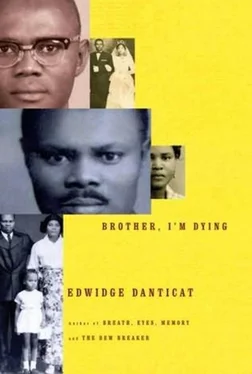A nurse asked my father to step on a scale soon after we arrived. This was the part of the visits he would come to dread most, for it offered proof that he was indeed shrinking. Before he became ill he had carried 170 pounds on his five-eleven frame. During that July 2004 visit he weighed 128 pounds.
When we stepped into his office, Dr. Padman quickly introduced himself. A short, bespectacled South Asian man with only a trace of an accent, he seemed, like my father and me, to have spent part of his life in a section of the world that still echoed in his voice. With the examining table and a full-size scale filling up the tiny room, there was space for only one seat across from his desk, where a computer screen was angled toward a barred window, away from the patient.
I stood behind my father’s chair and looked down at both him and the doctor, like a workplace inspector taking everything in while doing her best not to interfere.
“How are you doing, sir?” Dr. Padman asked.
“Not so good,” my father answered.
Throughout his illness, my father never told his doctors he was feeling “bad.” It was either “Not so good” or “Not so bad,” a literal translation of the Creole expression “Pa pi mal.”
“And how is the cough, sir?” Dr. Padman continued.
My father replied, “The same.”
I wondered whether Dr. Padman’s calling my father “sir” was an affectation, a point of effort in his bedside, or desk-side, manner or something he did naturally. Maybe he was one of those people who called everyone “sir,” especially those who were least likely to be addressed that way. Or maybe it was simply a way of not having to remember names.
Dr. Padman quickly scanned the computer screen, then pulled my father’s X-rays and CAT scan film out of a mustard yellow envelope. He held them up to the window light, then, glancing at the computer screen, asked my father, “Are you still on the codeine, sir?”
My father had stopped taking the codeine, which an emergency room physician had prescribed for him, because the codeine had caused him to fail the yearly drug test required by the Taxi and Limousine Commission for the renewal of his cabdriver’s license. He took advantage of Dr. Padman’s question to ask if Dr. Padman would write a letter for his Taxi and Limousine Commission appeal, stating that he was taking the codeine for legitimate medicinal purposes.
Dr. Padman nodded and made a note on a yellow pad. Then he picked up the phone and buzzed his assistant.
Edie was a skinny, perky Filipina who spoke every sentence at the top of her voice, as though it were being broadcast through a bullhorn at a pep rally.
“Good afternoon,” she bellowed, startling my father.
“Edie’s going to check your breathing, sir,” Dr. Padman told my father.
My father looked up at Edie, then back at the doctor with equal helplessness. He slowly pushed himself up by holding the back of the chair.
“We won’t be long,” Edie said, grabbing hold of one of my father’s elbows.
As my father disappeared from view, I slipped into the chair where he’d been sitting and tried to sneak a look at Dr. Padman’s computer, but the tilt of his screen was designed to give maximum view to the doctor and limited view to the patient.
“Edie is going to do a pulmonary function test,” he explained. “The test will require your father to blow into a tube so we can find out how much air is in the lungs.”
I imagined my father with this tube in his mouth, trying to fill it impossibly with air and failing over and over again. One did not have to be a pulmonologist to see that he couldn’t even blow out a small candle. He had no air to spare.
“I’m really worried about my father,” I said.
Perhaps thinking I was talking only about the test, he said, “Don’t worry. Edie will take good care of him.”
“In general,” I said. “I’m worried about his condition.”
“Your father has a very bad disease,” he said. “It’s called pulmonary fibrosis. You can look it up on the Internet. You’ll see it’s not very good.”
Suddenly it was as though we were discussing someone both of us barely knew. I almost expected to go home and look up the disease and find my father’s name listed under its many definitions and examples. With no better choices of words, deeds, or prayers, I resorted to a cliché, a common line from soap opera sickrooms.
“What’s his prognosis?” I asked.
“It depends on a lot of things,” he said, “but most people who are resistant to treatment live anywhere from six months to two years.”
My father’s body was resisting treatment. The codeine and prednisone he’d been prescribed by the emergency room physician were neither relieving his cough nor slowing down the gradually irreversible stiffening and scarring of his lungs.
“You should tell your loved ones about your father’s condition,” Dr. Padman said, as though this was the kind of information one could keep to oneself.
Was this the standard way to tell a family member (without the patient’s permission) that the patient was dying? Perhaps he didn’t want to add to my father’s stress by telling him directly that his disease was incurable. Later, however, he would plainly write it in his letter for my father’s appeal to the Taxi and Limousine Commission: “My patient André Miracin Danticat suffers from an incurable condition for which he is required to take codeine.”
My father never discussed the letter either before or after he xeroxed it and sent the original to the Taxi and Limousine Commission, which denied his appeal.
What causes an illness like this? I wondered as Dr. Padman and I waited for my father to return from his pulmonary function test. Could it be the persistent car fumes from the twenty-five-plus years my father had worked as a cabdriver? Carcinogens from the twenty-plus years he smoked as a young man, even though he hadn’t smoked in more than twenty-five years?
“What about a lung transplant?” I asked Dr. Padman. “Could my father have a lung transplant?”
“He’s sixty-nine years old,” he said, as though this too was news to me. “I’m afraid he’s past the age where he’d be put on the list. Besides, the transplant is no guarantee. There’s a very high probability of rejection.”
“Can he have surgery to cut out the bad part of the lung and leave the rest?” I asked.
“Both lungs in their entirety are scarred.”
I was beginning to feel that whatever I told him would be countered by some unworkable obstruction.
I heard my father’s shoes dragging across the floor, heading back toward us. I had come to recognize the sound of his loafers since he’d stopped lifting his feet while walking, to alleviate the pressure of literally having to carry his own weight.
Edie was standing behind him when he appeared in the doorway. Her shoulders drooping, she momentarily seemed as breathless as my father, who had been unable to get through the test. Each time she asked him to breathe into the tube, she reported, he would nearly collapse from coughing.
In the past two months or so, when my father stood for too long, his body would shake as though he might suddenly fall over. His body was shaking now. I got up and helped him into the chair across from the doctor, whom I expected to begin talking again, explaining my father’s condition to him. Surely he had only been practicing on me and was going to also tell my father, how “bad” the disease was, how many months he might have left to live.
He didn’t. Instead he prescribed more prednisone and codeine. My father didn’t say anything. He pushed his head back against the wall, closed his eyes and tried to take deep breaths, which came out as gasps.
Читать дальше












